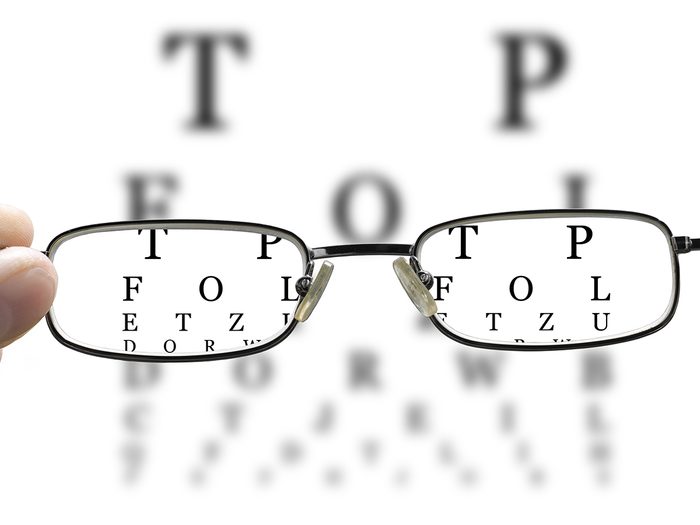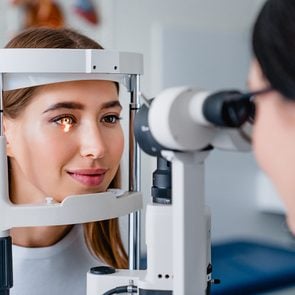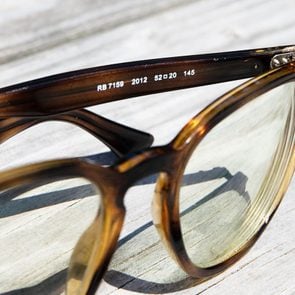10 Tips to Improve Your Eyesight

They're two of your most precious possessions, but chances are, you take your eyes for granted. Read on for 10 healthy habits that help protect your peepers.
Boost Your Eye Health With Blueberries
Mix a cup of blueberries with a cup of yogurt for breakfast in the morning. Blueberries are one of the richest fruit forms of antioxidants, and a study published in The Archives of Ophthalmology found that women and men who ate the greatest amount of fruit were the least likely to develop age-related macular degeneration (ARMD), the leading cause of blindness in older people.
Sneak in Spinach
Have spinach twice a week. Could be a spinach quiche, steamed spinach, or maybe Tuscan spinach-sautéed in some olive oil with garlic and raisins. Regardless, be sure to get your spinach. Studies find that lutein, a nutrient that is particularly abundant in spinach, may prevent ARMD and cataracts. Ideally, get your lutein in combination with some form of fat (olive oil works great) for the best absorption.
Take Car Precautions
Aim your car vents at your feet—not your eyes. Dry, air-conditioned air will suck the moisture out of eyes like a sponge. Aim the vents in your car away from your eyes, or wear sunglasses as a shield. Dry eyes can be more than an inconvenience; serious dryness can lead to corneal abrasions and even blindness if left untreated.
Monitor Your Monitor
Move your computer screen to just below eye level. Your eyes will close slightly when you’re staring at the computer, minimizing fluid evaporation and the risk of dry eye syndrome, says John Sheppard, M.D., who directs the ophthalmology residency program at Eastern Virginia Medical School in Norfolk, Virginia.
Feast on Fish
Eat fish twice a week. A study from Harvard evaluated the diets of 32,470 women and found those who ate the least amount of fish (thus getting the least amount of omega-3 fatty acids) had the highest risk of dry eye syndrome. (This is the healthiest fish you can eat.)
Be Cool
Turn down the heat in your house. Heat dries out the air, which, in turn, dries out your eyes. In the winter, you might also try adding some humidity with a humidifier or even bunching a lot of plants together in the room in which you spend the most time.
Hide Behind Shades
Wear sunglasses whenever you leave the house. When researchers examined the relationship between exposure to sunlight and cataracts or ARMD in Chesapeake Bay fishermen, they found that fishermen who protected their eyes from the harsh glare of the sun and its damaging UV rays were significantly less likely to develop these conditions than those who went bare-eyed. Wear the sunglasses even when it’s not sunny out, says Dr. Sheppard. They protect your eyes from the drying effects of wind.
Don a Broad-Brimmed Hat
Wear a broad-brimmed hat along with your sunglasses. A wide-brimmed hat or cap will block roughly 50 per cent of the UV radiation and reduce the UV radiation that may enter your eyes from above or around glasses.
Binge on Beets
Roast some fresh beets for an eye-saving side dish. Beets get their deep red colour from phytochemicals called anthocyanins, powerful antioxidants that protect the smaller blood vessels in your body, including those in your eyes. (Find out more surprising health benefits of beets.)
Give Yourself the Spa Treatment
Dab an essential oil of jasmine, peppermint, or vanilla on your arm and sniff. Jasmine, says scent researcher Alan R. Hirsch, M.D., of the Chicago-based Smell and Taste Treatment Research Foundation, increases the beta waves in the frontal lobes of your brain, promoting wakefulness and enabling you to focus better and see things more acutely. All three scents stimulate the limbic system in your brain, which, in turn, stimulates the rods in your eyes, which help you see in dim light.
Now that you know how to improve your eyesight, learn how to spot the telltale signs of cataracts.






